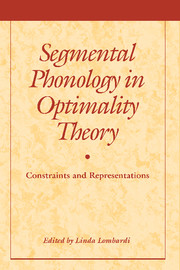
-
Select format
-
- Publisher:
- Cambridge University Press
- Publication date:
- July 2014
- August 2001
- ISBN:
- 9780511570582
- 9780521790574
- 9780521153508
- Dimensions:
- (228 x 152 mm)
- Weight & Pages:
- 0.55kg, 310 Pages
- Dimensions:
- (229 x 152 mm)
- Weight & Pages:
- 0.46kg, 310 Pages
- Subjects:
- Phonetics and Phonology, Language and Linguistics
You may already have access via personal or institutional login- Subjects:
- Phonetics and Phonology, Language and Linguistics
Book description
Optimality theory has rapidly become the dominant framework in formal phonological theory. OT fundamentally revises the basic notions of generative grammar, replacing rules and derivations with a system of interacting constraints. Early work in OT tended to concentrate mainly on prosodic phonology and the phonology-morphology interface, and it was not initially clear how the theory could attack the rich range of phenomena found in segmental alterations. However, there is a body of work that concentrates on working out the details of featural phonology with OT, and this work shows that the theory allows superior explanations of the typological possibilities and the underlying motivations for these phenomena. This volume, first published in 2001, brings together work by some of the influential researchers in this area, ranging from the authors of influential dissertations to prominent senior faculty.
Contents
Metrics
Full text views
Full text views help Loading metrics...
Loading metrics...
* Views captured on Cambridge Core between #date#. This data will be updated every 24 hours.
Usage data cannot currently be displayed.
Accessibility standard: Unknown
Why this information is here
This section outlines the accessibility features of this content - including support for screen readers, full keyboard navigation and high-contrast display options. This may not be relevant for you.
Accessibility Information
Accessibility compliance for the PDF of this book is currently unknown and may be updated in the future.


